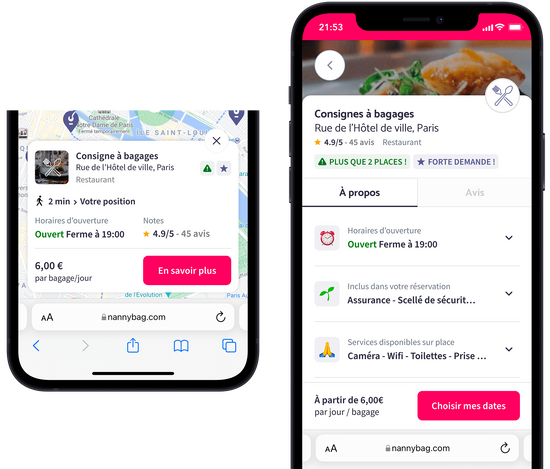FULL Guide to 2025 Singapore Cultural Festivals & Events

As we approach 2025, it's time to mark your calendar for Singapore's cultural festivals and events that illuminate the city-state’s vibrant multicultural tapestry. From the red and gold festivities of Chinese New Year to the spiritual solemnity of Vesak Day, these events celebrate Singapore’s diverse cultural heritage.
Additionally, don't miss the opportunity to partake in the unique traditions of visiting the graves, witnessing heart-pounding dragon boat races, and immersing yourself in the rich tapestry of popular festivals in Singapore, including the commemoration of the enlightenment and death of Buddha, as well as the exciting Singapore 2025 Events.
Furthermore, as you prepare to embrace these cultural festivities, ensure a hassle-free and enjoyable experience with the convenience of Nannybag's luggage storage near Singapore airport. Whether you're planning to visit the graves of loved ones or need secure luggage storage near Singapore Airport before or after your celebrations, Nannybag offers a reliable solution. With Nannybag, you can explore Singapore's cultural treasures with peace of mind, knowing that your belongings are safely stored, allowing you to fully immerse yourself in the vibrant tapestry of events and celebrations.
Chinese New Year: A Red and Gold Spectacle
When: Usually in January or February
Celebrating Chinese New Year in Singapore is a feast for the senses, traditionally occurring in January or February. The city comes alive with an exuberant display of red lanterns and gold ornaments, symbols of prosperity and good fortune. Streets and homes are adorned in these auspicious colors, creating a festive and joyous atmosphere. The air is filled with the sounds of traditional music and the tantalizing aromas of festive foods.
One of the highlights of the Lunar New Year celebrations in Singapore is the Chingay Parade. This vibrant event is a spectacular display of cultural diversity and creativity, featuring colorful floats, energetic dancing dragons, and traditional lion dances. The parade is a mesmerizing showcase of Singapore's multicultural heritage, with performers from various ethnic backgrounds coming together to celebrate the new year.
Hari Raya Puasa: A Celebration of Faith
When: Depends on the Islamic calendar
Hari Raya Puasa, marking the end of Ramadan, is a significant celebration in Singapore. The Islamic calendar determines its date. The festivities during this period are a deep expression of faith and joy. Geylang Serai, known for its strong Malay heritage, has transformed into a bustling hub of activity with its festive bazaars.
These markets are a sensory delight, offering everything from traditional Malay cuisine to colorful attire and decorations. The bazaars provide an opportunity to experience the rich cultural tapestry of the Malay community.
Another focal point of Hari Raya Puasa celebrations is the Sri Srinivasa Perumal Temple. Although a Hindu temple, it epitomizes Singapore's cultural inclusivity and harmony. During Hari Raya, the temple vicinity comes alive with colorful festivities and prayer ceremonies, attracting visitors from various communities who come to witness and partake in the celebrations.
Vesak Day: Honoring the Buddha
When: Falls in May
Vesak Day, also known as Buddha Purnima, is a sacred and significant holiday that falls in the month of May. It is a day dedicated to commemorating the birth, enlightenment, and death of Buddha, and it holds immense religious and cultural importance for Buddhists in Singapore and around the world.
On Vesak Day, Buddhist temples across Singapore come alive with a sense of spirituality and devotion. The day begins with devotees visiting temples to offer prayers, light incense, and make offerings. The atmosphere is serene and filled with the fragrance of incense, creating a deeply contemplative environment.
One of the most iconic temples to visit on Vesak Day is the Sri Thendayuthapani Temple. This temple is known for its grand celebrations, including candlelit processions that symbolize the enlightenment of Buddha. The temple's premises are adorned with colorful decorations and vibrant flowers, creating a visual spectacle that reflects the joy and reverence of the occasion.

Dragon Boat Festival: A Day of Races and Rituals
When: Falls on the fifth day of the fifth month of the Chinese calendar
The Dragon Boat Festival, also known as the Duanwu Festival, is a dynamic and culturally rich celebration on the fifth day of the fifth month of the Chinese calendar. This festival is about thrilling dragon boat races and honoring traditions and rituals that date back centuries.
One of the highlights of the Dragon Boat Festival in Singapore is the exhilarating dragon boat races. These races occur at locations like Bedok Reservoir, where teams paddle their elaborately decorated dragon boats in a spirited competition. The races are thrilling, with drummers providing a rhythmic beat to synchronize the paddlers' strokes.
Beyond the races, the festival offers a unique opportunity to learn about its cultural significance. Visitors can discover the origins of the festival and the story of Qu Yuan, a patriotic poet. Traditional delicacies like zongzi sticky rice dumplings wrapped in bamboo leaves are enjoyed during this time, adding a delicious dimension to the festivities.
Hari Raya Haji: A Reflection of Devotion
When: Determined by the Islamic lunar calendar
Hari Raya Haji, also known as Eid al-Adha, is a significant Islamic festival in Singapore that follows the Islamic lunar calendar, making its date variable each year. This solemn occasion holds deep religious and cultural significance for the Muslim community in Singapore.
One of the key observances during Hari Raya Haji is the visitation of graves. Muslims take this opportunity to pay their respects to their loved ones, offering prayers and remembering their legacies. The cemeteries are adorned with colorful flowers, adding a sense of serenity to the atmosphere.
Hari Raya Haji also provides cultural insights into the Islamic traditions that mark this sacred festival. It's a time when Muslims gather in mosques to offer prayers and reflect on their faith. Giving to the less fortunate is also an integral part of the celebrations, emphasizing the values of charity and compassion.
Lantern Festival: Lights in the Night
When: Typically in February or March
The Lantern Festival, also known as the Mid-Autumn Festival, is a captivating celebration that usually takes place in February or March. This festival is a visual and cultural spectacle featuring beautifully lit lanterns and delicious mooncakes.
One of the central elements of the Lantern Festival is the tradition of mooncake sharing. Families and friends exchange these delectable pastries in various flavors and designs. It's a time for togetherness and appreciation of the full moon's beauty.
In Singapore, Chinatown comes alive during the Lantern Festival. The streets are adorned with colorful lanterns, creating a mesmerizing display of lights. Cultural performances take place, offering a glimpse into traditional Chinese arts and folklore. The festive atmosphere in Chinatown is electric, and visitors can join in the celebrations, immersing themselves in the vibrant cultural experience.

Deepavali (Diwali): Festival of Lights
When: Usually in October or November
Deepavali, also known as Diwali, is a grand celebration of light and life, typically observed in October or November. This Hindu festival is a vibrant spectacle of colorful lights, symbolizing the victory of light over darkness and good over evil.
Deepavali transforms Little India into a captivating display of lights and decorations in Singapore. The streets come alive with ornate oil lamps, known as diyas, and intricate rangoli designs. Families exchange sweets and gifts, fostering unity and joy. The Sri Veeramakaliamman Temple in Little India is a focal point, where traditional rituals and cultural performances add to the festive spirit.
Thaipusam: A Devotional Hindu Festival
When: Typically in January or February
Thaipusam is a profound Hindu festival dedicated to Lord Murugan, the deity of war and victory, usually observed in January or February.
The festival is marked by striking processions where devotees carry kavadis, intricate and heavy structures, as acts of devotion. Some devotees pierce their bodies with hooks and skewers, symbolizing their faith and penance.
Singapore's Thaipusam processions, starting from Sri Srinivasa Perumal Temple and proceeding to Sri Thendayuthapani Temple, are awe-inspiring. The atmosphere is charged with spiritual fervor and devotion, making it a unique and deeply cultural experience.

Say hello to exploring and goodbye to heavy bags!
What if you could enjoy every minute in the city without the burden of your bags?
- Safe luggage storage for a flat daily price of SGD 6.50/luggage item
- Included luggage protection of up to €10000 in case of breakage, loss or theft
